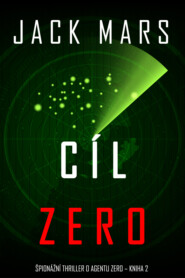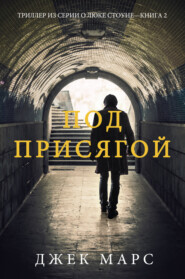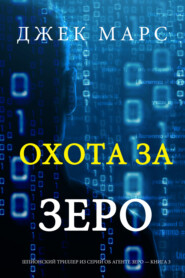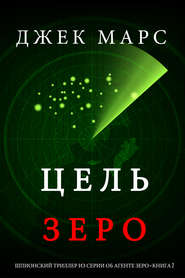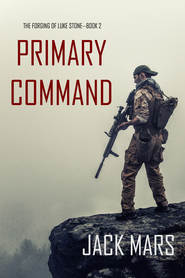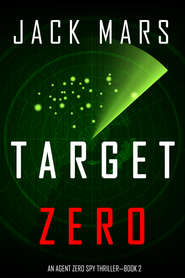По всем вопросам обращайтесь на: info@litportal.ru
(©) 2003-2025.
✖
File Zero
Автор
Год написания книги
2019
Настройки чтения
Размер шрифта
Высота строк
Поля
Without breaking his stride, Zero turned right again, slipping down a narrow thoroughfare between two buildings. It was barely six feet across, not even wide enough to be called an alley. About halfway down its length he stopped and turned.
At the mouth of the throughway stood one of his two pursuers. The man was around his age, a few inches taller, with a wiry frame and a few days’ worth of coarse dark hair on his chin. He wore black boots and jeans and a black leather jacket.
“Baker,” Zero said instinctively. This man was a member of the Division, a private security group that the CIA occasionally contracted to assist with international affairs. They were veritable mercenaries, the same group that had made a bid for his life not a week ago at the Brotherhood’s compound outside of Al-Baghdadi. The same group that had attempted to jump Agent Watson and kidnap his daughters in Switzerland.
But this man in particular was familiar to him. As soon as Zero saw his face, he remembered: back in 2013, the Division had been called in to help out with a hostage situation between a faction of Al Qaeda and a dozen US soldiers. Baker had been among them.
The mercenary raised an eyebrow. “You know me?”
Shit. Zero scolded himself for blurting out the man’s name. He had shown his hand. He shrugged and tried to play it off. “Some things come back. In pieces.”
Baker smirked. “Sure, Zero. What was in the bank?”
“Money. I made a withdrawal.”
The merc shook his head. “I don’t think so. See, I called it in. You don’t have an account there. But techs noticed a safe deposit box in you and your dead wife’s name.”
Zero saw red for a moment at the offhanded comment about Kate and nearly lost his cool, but he forced himself to remain calm.
“I’m guessing you made a withdrawal,” Baker said, “but not money. What was in the box, Zero?”
Guessing? Either Baker was bluffing, or the agency really didn’t know about the safe deposit box before now. Which meant that the CIA was not responsible for the missing documents. But he could be lying.
Zero heard footsteps behind him and glanced quickly over his shoulder to see the big man from the street corner stepping into view at the opposite end of the narrow causeway. His head was shaved bald but his chin was obscured in a thick brown beard, the bottom lip jutting in a scowl. He looked like he could have been a linebacker or a professional wrestler.
I don’t know him. Must be new, Zero thought wryly.
When he turned back to Baker, the wiry mercenary had one hand inside his jacket. It came back out slowly, and Zero wasn’t the least bit surprised to see it gripping a black Sig Sauer.
“What’s that for? You going to shoot me in broad daylight?” Zero held up his damaged right hand. “I’m unarmed and one-handed.”
“I’ve seen what you can do with one hand,” Baker said nonchalantly as he screwed a suppressor to the barrel of the pistol. “This is for self-defense. What was in the box, Zero?”
Zero shrugged a shoulder. “You’re going to have to shoot me first.” How the hell am I going to get out of this? He wasn’t taunting when he said he was one-handed. He was at a huge disadvantage against one of them, let alone two.
“Our orders are nonlethal force,” Baker remarked. He looked past Zero to his burly cohort. “What do you think, Stevens? A shot to a kneecap isn’t lethal, right?”
The big man, Stevens, didn’t respond—at least not in words. He merely grunted.
Nonlethal force. These two weren’t sent to kill him; they were sent to take whatever he had retrieved from the bank, and likely determine whether or not they should bring him in. It’s too late to kill me now. The powers-that-be needed to know what he knew, and who else he had told. It might not be too suspicious to those not involved in the plot if Agent Zero suddenly ended up dead, but if they had to take out others—Strickland, Watson, Maria—people would start asking the wrong sort of questions and poking around where their dirty laundry might be found.
I need a distraction. “Say, how’s Fitzpatrick?” he asked as casually as he could. He knew he would be goading them, but he needed to buy some time. “Last I saw him he was kind of… smeared, for lack of a better term.”
Baker’s lip curled slightly. The leader of the Division, Fitzpatrick, had been hit by a car in a New York parking deck by Mossad Agent Talia Mendel. As far as Zero knew, Fitzpatrick was still alive, but he didn’t know the extent of his wounds.
“He’s alive,” Baker replied evenly, “despite your friends’ best efforts. Seventeen broken bones, a punctured lung, loss of vision in his right eye.”
Zero clucked his tongue in dismay. “I should really send him some flowers—”
Baker snapped the pistol up in both hands. “That’s enough. It’s been real nice catching up, but if you don’t tell me what was in the box, I am going to shoot you. And then I’m going to have Stevens here drag your bleeding body by the ankle to a nice quiet place where we can hook you up to a car battery until you tell us exactly how much you remember.”
Zero wrinkled his nose. “That sounds unpleasant.”
Baker fired a shot. The gun made a thwip! and a small chunk of the brick façade to Zero’s right exploded, sending small pieces of stone smacking against his face.
His hands were up in an instant. “Whoa! All right. Jesus. I’ll tell you.” Still his pulse hardly quickened.
I have what they want. I am in control here.
“It’s a USB stick. It has information on it.”
“Give it here,” Baker ordered.
“Can I reach into my pocket for it?”
“Slowly,” Baker growled, the Sig Sauer trained at Zero’s forehead.
“Okay.” Zero showed his empty left hand, wiggling the fingers, and then slowly snaked the hand down to his pants pocket. Baker is about five yards away. With his hand in his pocket, he gripped the USB stick with two fingers, pinching it between the index and middle. Stevens is about seven yards away. He palmed the lockback knife with his pinky and ring fingers, securing it with his thumb. Just like the Tueller Drill.
That morning, he would have sworn he had never heard the name Dennis Tueller, but anyone who had ever been trained to bring a knife to a gun fight would know it. In 1983, Sergeant Tueller ran a series of tests to determine how quickly an attacker with a knife could cover a distance of approximately twenty-one feet—and if a defender with a holstered gun could react in time.
Less than two seconds. That was the average time it took an attacker to sprint twenty-one feet—seven yards—to a target. The problem was that Baker’s gun wasn’t holstered.
But Stevens hadn’t drawn yet.
“See?” Zero raised the USB stick, pinched between two fingers, keeping the back of his hand facing Baker.
“Toss it,” Baker demanded. Over the mercenary’s shoulder, a few passersby talked and laughed as they walked by the mouth of the narrow alley. A young man among them glanced down the causeway, but with Baker’s back to them he didn’t see the Sig Sauer. Instead the man just flashed a brief frown and kept right on walking.
I could really use a distraction. But Zero wasn’t willing to call out to anyone, to put anyone else in harm’s way.
Baker shifted the grip on his pistol to one hand and held the other out, palm up, waiting for Zero to toss the USB stick.
So he did. He curled his arm back and tossed the USB drive toward Baker in an underhand motion, flicking it into a high arc. As he released the stick, he slid the lockback knife from his palm to his fingers.
Then he catapulted himself from his mark like a shot, snapping open the knife as he did.
As Baker’s gaze rose from his target to the skinny black drive soaring in an arc through the air, Zero sprinted from his position—but not toward Baker. He hurtled toward the larger man like a shot.
One-point-four seconds. He had performed the Tueller Drill a thousand times, had trained for this exact scenario, even remembered it as clearly as if it had happened yesterday. A high-precision radar gun in a CIA training field had clocked him at an average of one-point-four seconds to reach a target approximately seven yards away.
The amount of minute math that crossed his mind in an instant was staggering. It had always been there, ingrained through insane amounts of repetition and study, locked away in the recesses of his limbic system, waiting for the opportunity to burst out again. Average human reaction speed was a half second to three-quarters of a second. Even a professional like Baker required at least a quarter of a second between shots on a semi-auto pistol like the Sig Sauer. And Zero was a moving target.
The big man, Stevens, was not quick. He barely had the pistol free of his holster, his eyes involuntarily widening in surprise at Zero’s speed as he vaulted toward him. The blade was already snapped open. Zero launched himself the last six feet, leaping toward Stevens and sliding the tip of the knife, in and out, one motion, into his throat.
With his wrapped right hand he reached out for Stevens’s big shoulder and, as the knife tip slid out again, Zero slingshot himself around the large man’s body. Two shots rang out behind him—thwip-thwip from the suppressed pistol—and struck Stevens in the chest as Zero landed behind him. Sharp, astounding pain burned in his injured hand, but the adrenaline was there now, coursing through him as he dropped the knife and reached around for Stevens’s pistol before the big man could fall. He snapped it out of the beefy fist and, safe behind his broad human shield, fired two shots at Baker.
He was a good shot with his left hand, though not quite as good as his right. One of the shots missed. Glass shattered somewhere beyond the alley. The second thunderclap of a shot—Stevens’s Beretta wasn’t outfitted with a suppressor—struck Baker in the forehead.
At the mouth of the throughway stood one of his two pursuers. The man was around his age, a few inches taller, with a wiry frame and a few days’ worth of coarse dark hair on his chin. He wore black boots and jeans and a black leather jacket.
“Baker,” Zero said instinctively. This man was a member of the Division, a private security group that the CIA occasionally contracted to assist with international affairs. They were veritable mercenaries, the same group that had made a bid for his life not a week ago at the Brotherhood’s compound outside of Al-Baghdadi. The same group that had attempted to jump Agent Watson and kidnap his daughters in Switzerland.
But this man in particular was familiar to him. As soon as Zero saw his face, he remembered: back in 2013, the Division had been called in to help out with a hostage situation between a faction of Al Qaeda and a dozen US soldiers. Baker had been among them.
The mercenary raised an eyebrow. “You know me?”
Shit. Zero scolded himself for blurting out the man’s name. He had shown his hand. He shrugged and tried to play it off. “Some things come back. In pieces.”
Baker smirked. “Sure, Zero. What was in the bank?”
“Money. I made a withdrawal.”
The merc shook his head. “I don’t think so. See, I called it in. You don’t have an account there. But techs noticed a safe deposit box in you and your dead wife’s name.”
Zero saw red for a moment at the offhanded comment about Kate and nearly lost his cool, but he forced himself to remain calm.
“I’m guessing you made a withdrawal,” Baker said, “but not money. What was in the box, Zero?”
Guessing? Either Baker was bluffing, or the agency really didn’t know about the safe deposit box before now. Which meant that the CIA was not responsible for the missing documents. But he could be lying.
Zero heard footsteps behind him and glanced quickly over his shoulder to see the big man from the street corner stepping into view at the opposite end of the narrow causeway. His head was shaved bald but his chin was obscured in a thick brown beard, the bottom lip jutting in a scowl. He looked like he could have been a linebacker or a professional wrestler.
I don’t know him. Must be new, Zero thought wryly.
When he turned back to Baker, the wiry mercenary had one hand inside his jacket. It came back out slowly, and Zero wasn’t the least bit surprised to see it gripping a black Sig Sauer.
“What’s that for? You going to shoot me in broad daylight?” Zero held up his damaged right hand. “I’m unarmed and one-handed.”
“I’ve seen what you can do with one hand,” Baker said nonchalantly as he screwed a suppressor to the barrel of the pistol. “This is for self-defense. What was in the box, Zero?”
Zero shrugged a shoulder. “You’re going to have to shoot me first.” How the hell am I going to get out of this? He wasn’t taunting when he said he was one-handed. He was at a huge disadvantage against one of them, let alone two.
“Our orders are nonlethal force,” Baker remarked. He looked past Zero to his burly cohort. “What do you think, Stevens? A shot to a kneecap isn’t lethal, right?”
The big man, Stevens, didn’t respond—at least not in words. He merely grunted.
Nonlethal force. These two weren’t sent to kill him; they were sent to take whatever he had retrieved from the bank, and likely determine whether or not they should bring him in. It’s too late to kill me now. The powers-that-be needed to know what he knew, and who else he had told. It might not be too suspicious to those not involved in the plot if Agent Zero suddenly ended up dead, but if they had to take out others—Strickland, Watson, Maria—people would start asking the wrong sort of questions and poking around where their dirty laundry might be found.
I need a distraction. “Say, how’s Fitzpatrick?” he asked as casually as he could. He knew he would be goading them, but he needed to buy some time. “Last I saw him he was kind of… smeared, for lack of a better term.”
Baker’s lip curled slightly. The leader of the Division, Fitzpatrick, had been hit by a car in a New York parking deck by Mossad Agent Talia Mendel. As far as Zero knew, Fitzpatrick was still alive, but he didn’t know the extent of his wounds.
“He’s alive,” Baker replied evenly, “despite your friends’ best efforts. Seventeen broken bones, a punctured lung, loss of vision in his right eye.”
Zero clucked his tongue in dismay. “I should really send him some flowers—”
Baker snapped the pistol up in both hands. “That’s enough. It’s been real nice catching up, but if you don’t tell me what was in the box, I am going to shoot you. And then I’m going to have Stevens here drag your bleeding body by the ankle to a nice quiet place where we can hook you up to a car battery until you tell us exactly how much you remember.”
Zero wrinkled his nose. “That sounds unpleasant.”
Baker fired a shot. The gun made a thwip! and a small chunk of the brick façade to Zero’s right exploded, sending small pieces of stone smacking against his face.
His hands were up in an instant. “Whoa! All right. Jesus. I’ll tell you.” Still his pulse hardly quickened.
I have what they want. I am in control here.
“It’s a USB stick. It has information on it.”
“Give it here,” Baker ordered.
“Can I reach into my pocket for it?”
“Slowly,” Baker growled, the Sig Sauer trained at Zero’s forehead.
“Okay.” Zero showed his empty left hand, wiggling the fingers, and then slowly snaked the hand down to his pants pocket. Baker is about five yards away. With his hand in his pocket, he gripped the USB stick with two fingers, pinching it between the index and middle. Stevens is about seven yards away. He palmed the lockback knife with his pinky and ring fingers, securing it with his thumb. Just like the Tueller Drill.
That morning, he would have sworn he had never heard the name Dennis Tueller, but anyone who had ever been trained to bring a knife to a gun fight would know it. In 1983, Sergeant Tueller ran a series of tests to determine how quickly an attacker with a knife could cover a distance of approximately twenty-one feet—and if a defender with a holstered gun could react in time.
Less than two seconds. That was the average time it took an attacker to sprint twenty-one feet—seven yards—to a target. The problem was that Baker’s gun wasn’t holstered.
But Stevens hadn’t drawn yet.
“See?” Zero raised the USB stick, pinched between two fingers, keeping the back of his hand facing Baker.
“Toss it,” Baker demanded. Over the mercenary’s shoulder, a few passersby talked and laughed as they walked by the mouth of the narrow alley. A young man among them glanced down the causeway, but with Baker’s back to them he didn’t see the Sig Sauer. Instead the man just flashed a brief frown and kept right on walking.
I could really use a distraction. But Zero wasn’t willing to call out to anyone, to put anyone else in harm’s way.
Baker shifted the grip on his pistol to one hand and held the other out, palm up, waiting for Zero to toss the USB stick.
So he did. He curled his arm back and tossed the USB drive toward Baker in an underhand motion, flicking it into a high arc. As he released the stick, he slid the lockback knife from his palm to his fingers.
Then he catapulted himself from his mark like a shot, snapping open the knife as he did.
As Baker’s gaze rose from his target to the skinny black drive soaring in an arc through the air, Zero sprinted from his position—but not toward Baker. He hurtled toward the larger man like a shot.
One-point-four seconds. He had performed the Tueller Drill a thousand times, had trained for this exact scenario, even remembered it as clearly as if it had happened yesterday. A high-precision radar gun in a CIA training field had clocked him at an average of one-point-four seconds to reach a target approximately seven yards away.
The amount of minute math that crossed his mind in an instant was staggering. It had always been there, ingrained through insane amounts of repetition and study, locked away in the recesses of his limbic system, waiting for the opportunity to burst out again. Average human reaction speed was a half second to three-quarters of a second. Even a professional like Baker required at least a quarter of a second between shots on a semi-auto pistol like the Sig Sauer. And Zero was a moving target.
The big man, Stevens, was not quick. He barely had the pistol free of his holster, his eyes involuntarily widening in surprise at Zero’s speed as he vaulted toward him. The blade was already snapped open. Zero launched himself the last six feet, leaping toward Stevens and sliding the tip of the knife, in and out, one motion, into his throat.
With his wrapped right hand he reached out for Stevens’s big shoulder and, as the knife tip slid out again, Zero slingshot himself around the large man’s body. Two shots rang out behind him—thwip-thwip from the suppressed pistol—and struck Stevens in the chest as Zero landed behind him. Sharp, astounding pain burned in his injured hand, but the adrenaline was there now, coursing through him as he dropped the knife and reached around for Stevens’s pistol before the big man could fall. He snapped it out of the beefy fist and, safe behind his broad human shield, fired two shots at Baker.
He was a good shot with his left hand, though not quite as good as his right. One of the shots missed. Glass shattered somewhere beyond the alley. The second thunderclap of a shot—Stevens’s Beretta wasn’t outfitted with a suppressor—struck Baker in the forehead.






